The document is an in-depth exploration of Python's object-oriented programming model, covering core concepts such as classes, objects, mutable and immutable types, and the principles of inheritance and polymorphism. It discusses various aspects of Python classes, including custom classes, decorators, metaclasses, and built-in functions, while providing practical examples and code snippets. Additionally, it highlights advanced topics like method resolution order, context managers, and descriptors to illustrate the flexibility and power of Python's object model.

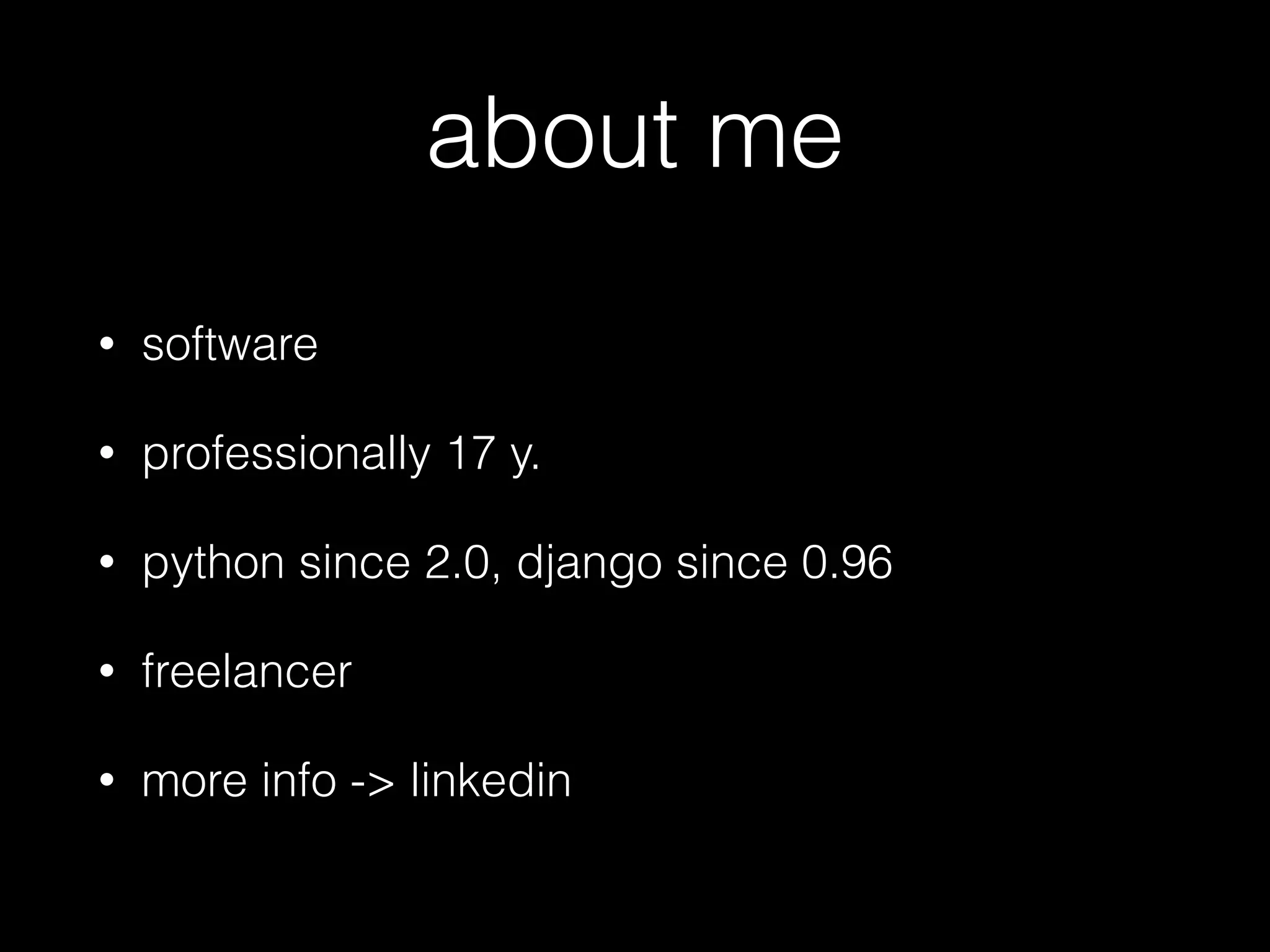
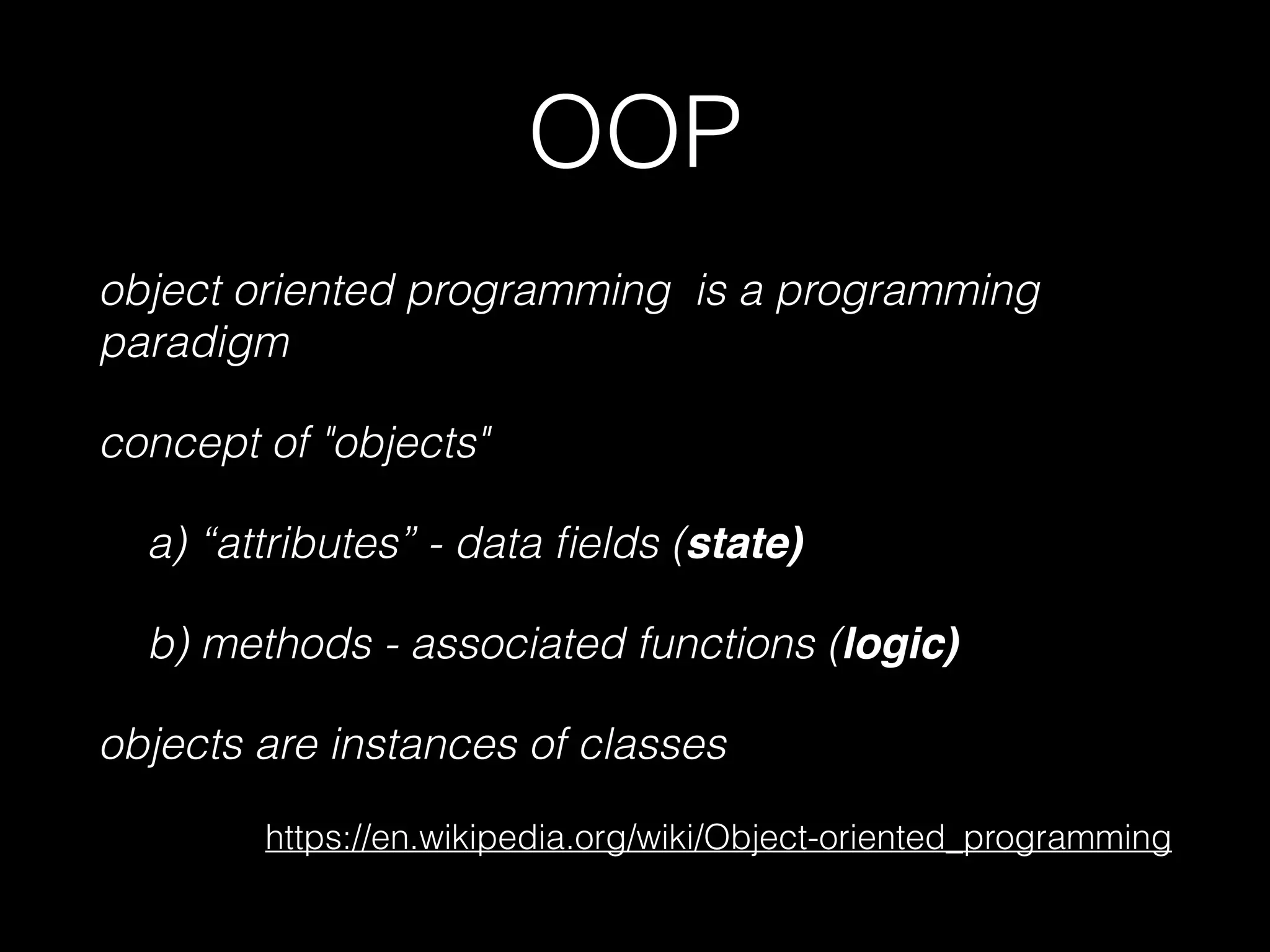
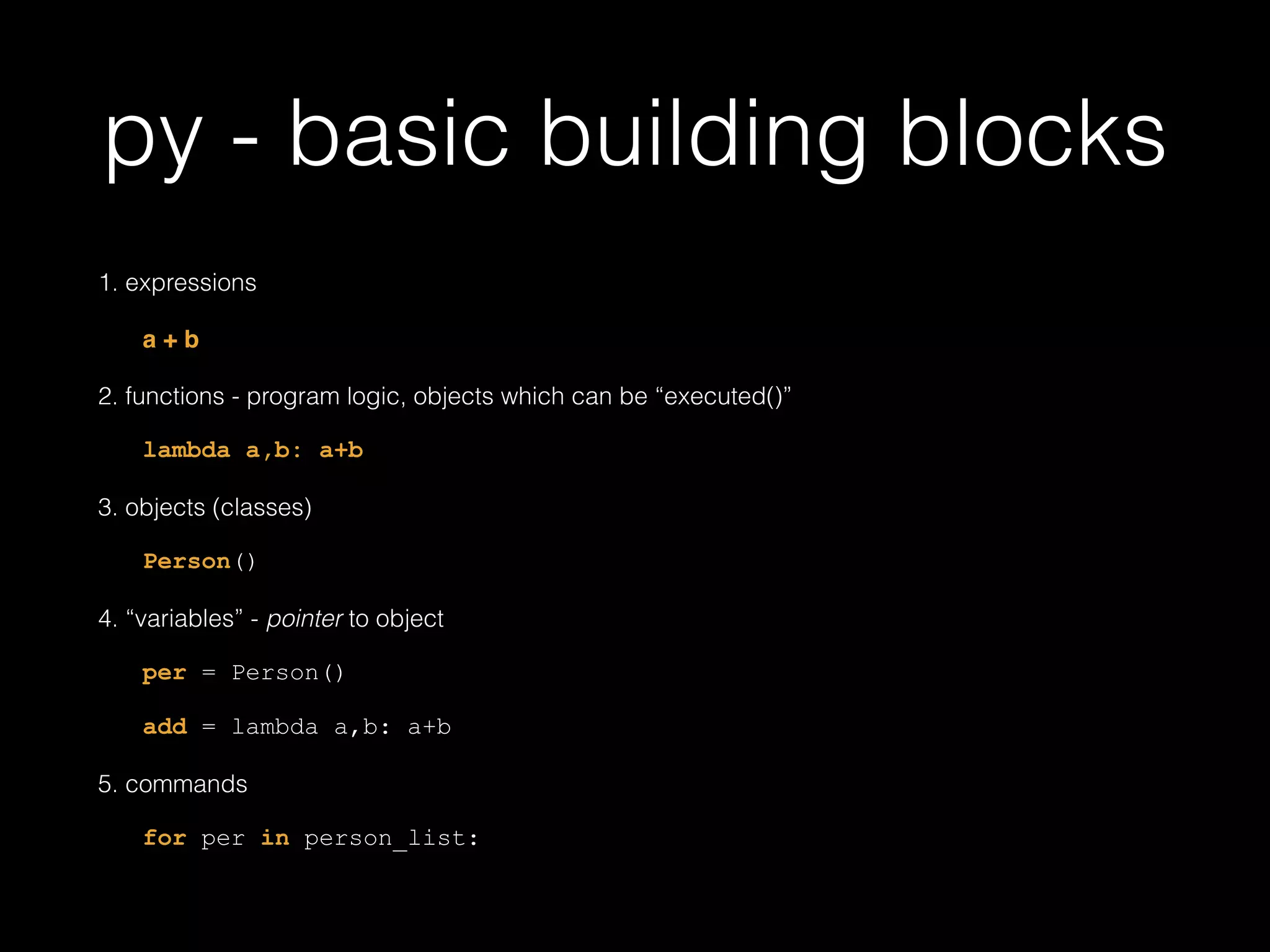
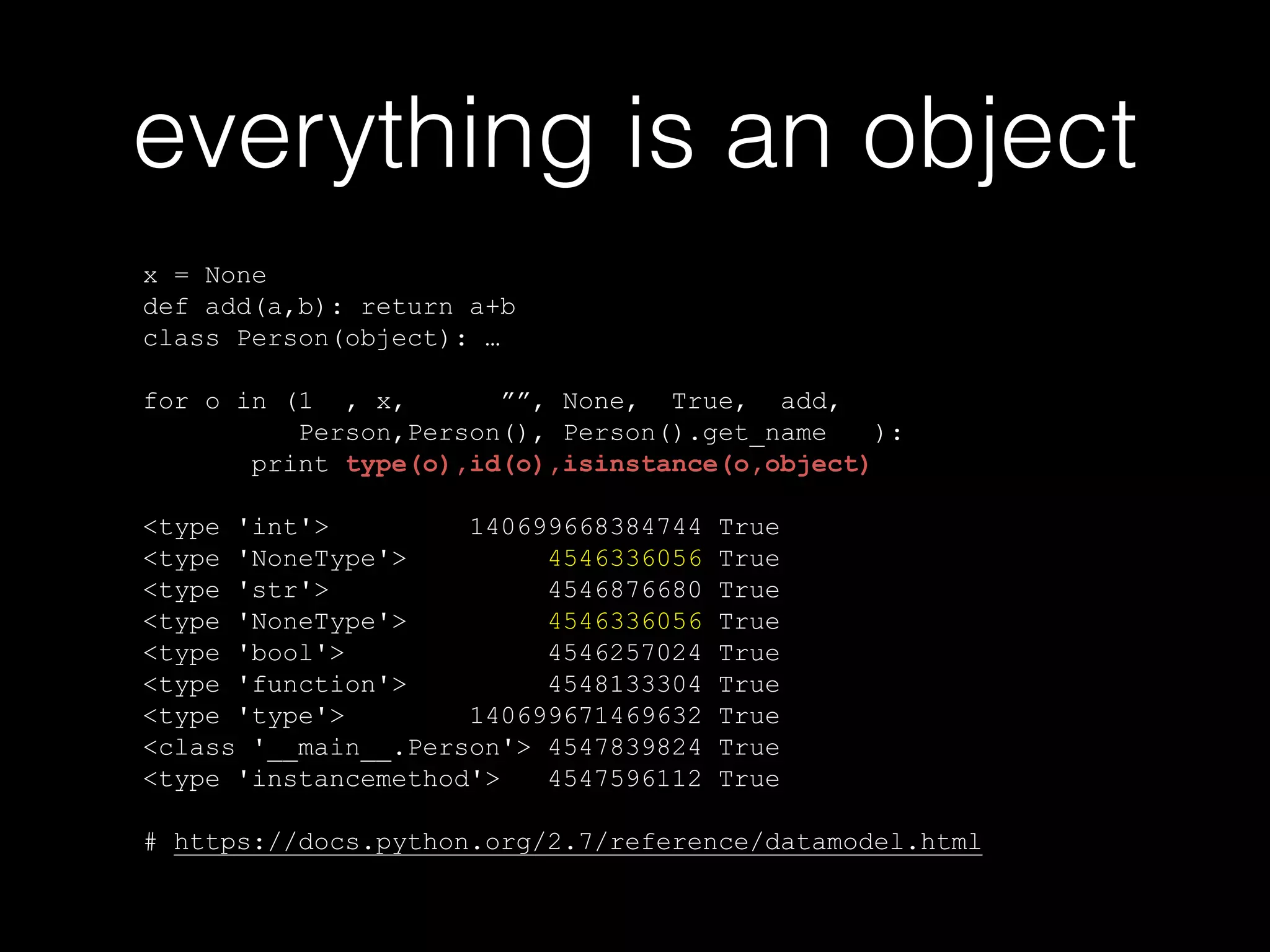
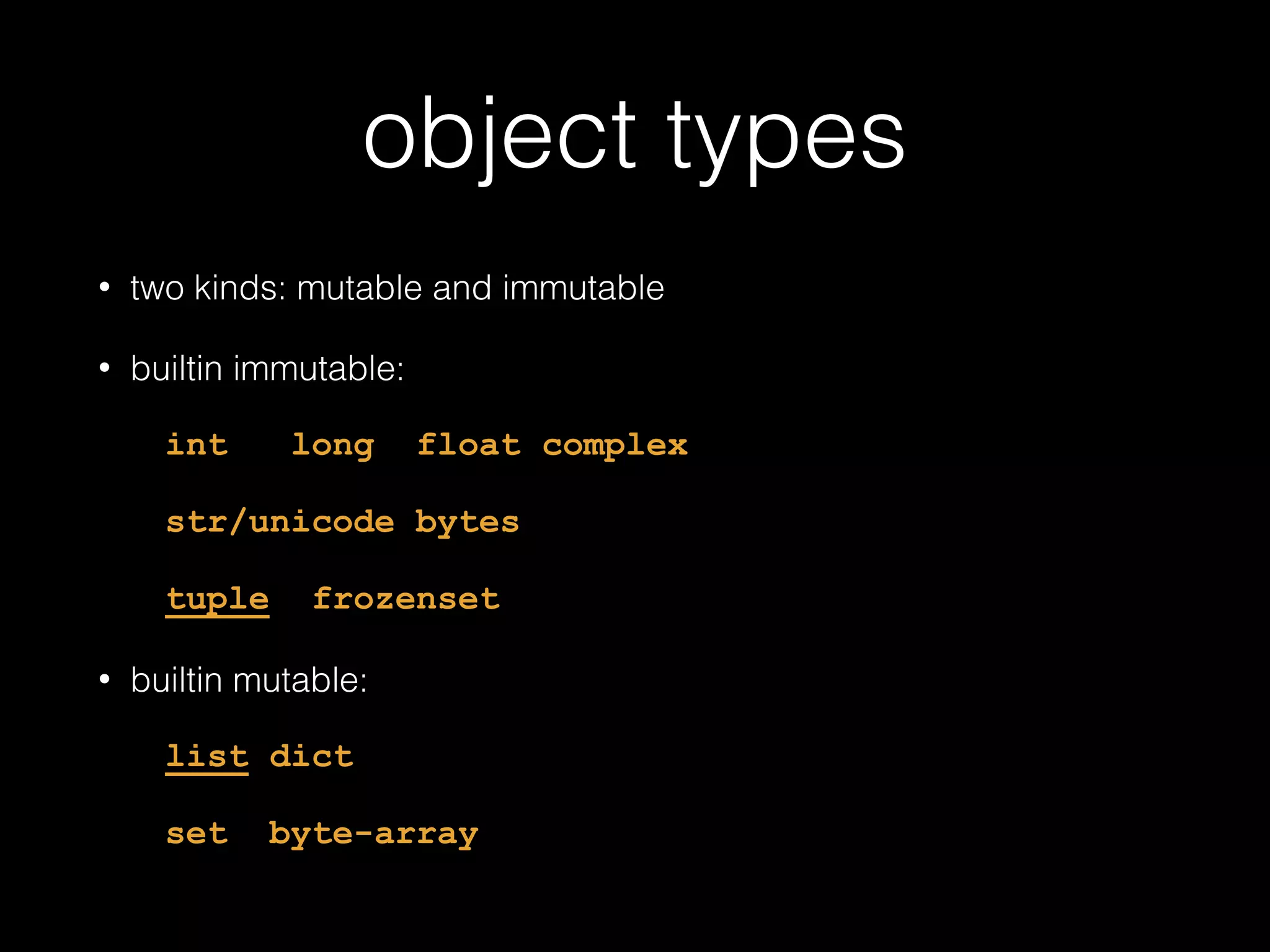
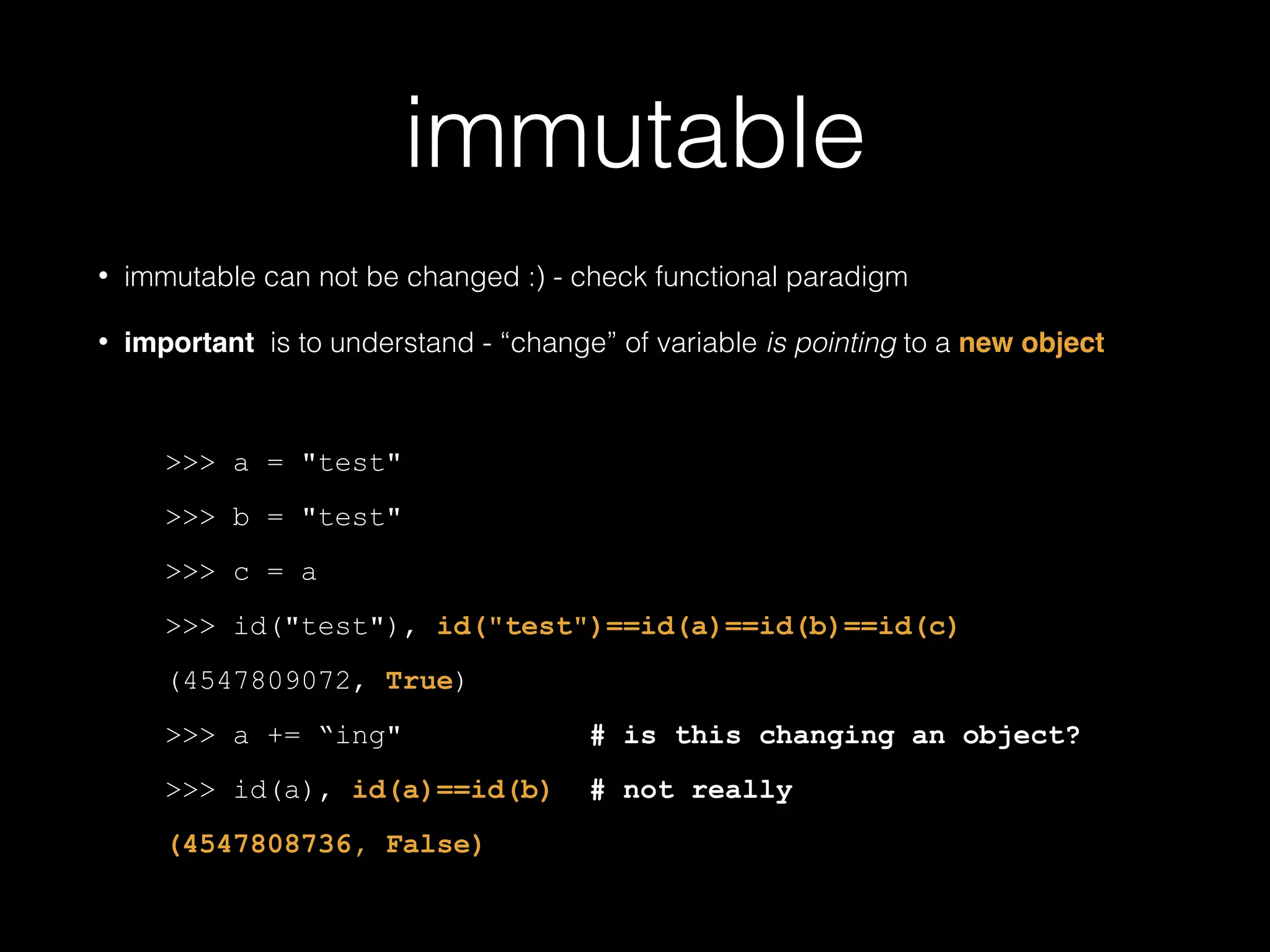
![mutable • supports changing the object in place ! >>> a, b = ["test"], ["test"] >>> c = a >>> id(a),id(b),id(c) (4548130576, 4547733192, 4548130576) >>> a.append(3) # promjena in-place >>> id(a),id(b),id(c) (4548130576, 4547733192, 4548130576) ! BUT - first member of both objects is immutable object and everywhere is the same! >>> id(a[0])==id(b[0])==id(c[0]) True](https://image.slidesharecdn.com/objectclassdict-python-en-140613084857-phpapp02/75/Object-__class__-__dict__-python-object-model-and-friends-with-examples-8-2048.jpg)
![global and local • every context has its own global and local variables - use functions globals(), locals() • global variables are read-only, but again there is a difference between mutable and immutable • global keyword ! >>> g1, g2, g3 = 3, [3], 3 >>> id(g1), id(g2), id(g3) 2084115824 2523984 2084115824 ! def fun(): # print g1 # produces: SyntaxWarning: name 'g1' is used prior to global declaration global g1 print g1, g2, g3 # g3 = 4 # if this is enabled then previous "print g3" and raises an Error print "fg1:", id(g1), id(g2), id(g3) g1 = 4 # change of global variable to new object g2.append(4) # although g2 variable is read-only, the object is NOT! print "fg2:", id(g1), id(g2), id(g3) # g1 has changed id locally and globally ! >>> fun() 3 [3] 3 fg1: 2084115824 2523984 2084115824 fg2: 2084115812 2523984 2084115824 >>> print g1, g2, g3 4 [3, 4] 3 # change on g1 and g2 can be seen in object values >>> print id(g1), id(g2), id(g3) # the same as fg2: - function has changed global g1 2084115812 2523984 2084115824](https://image.slidesharecdn.com/objectclassdict-python-en-140613084857-phpapp02/75/Object-__class__-__dict__-python-object-model-and-friends-with-examples-9-2048.jpg)
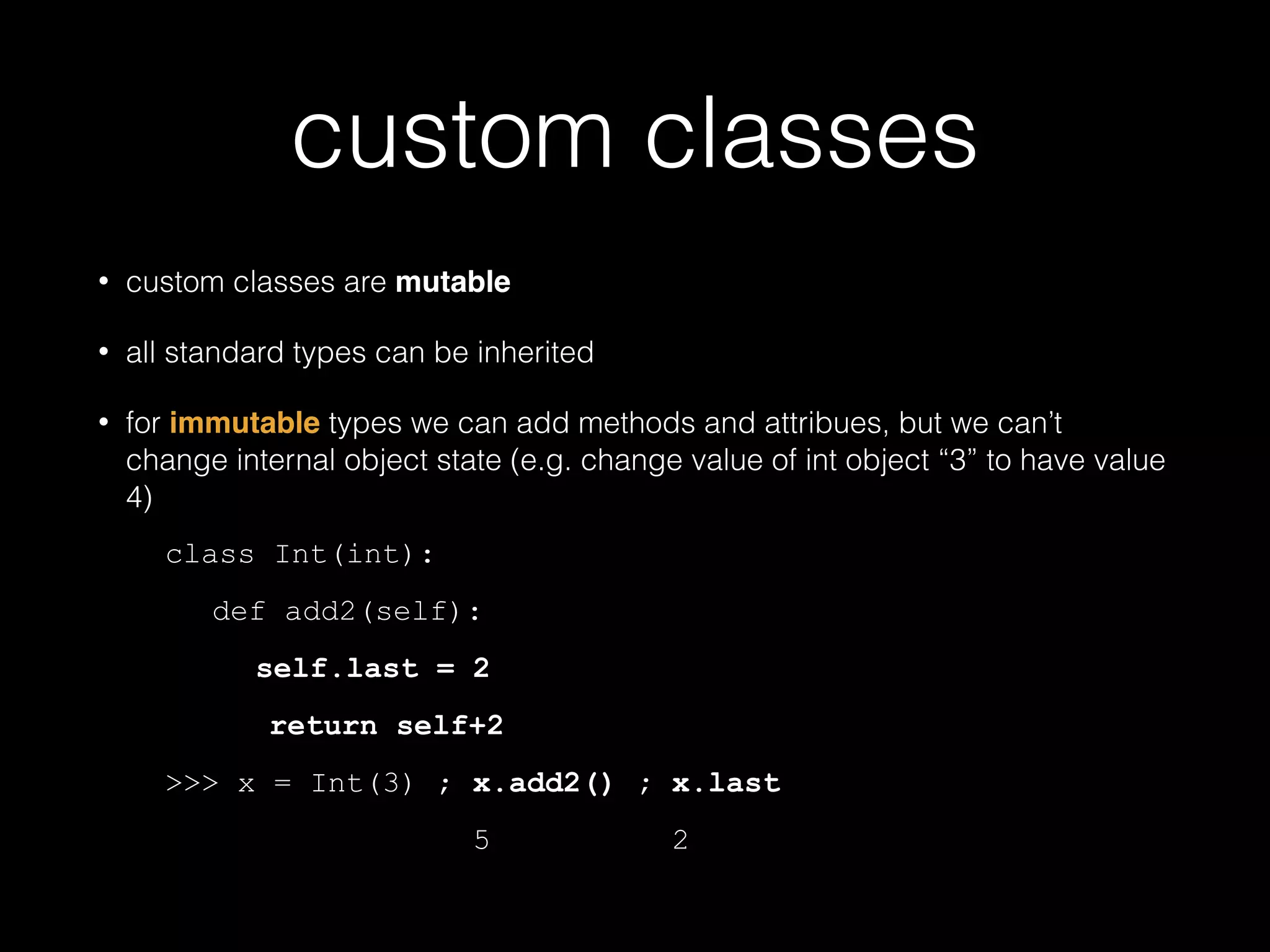
![custom classes • it is much more interesting to inherit mutable objects - e.g. ! class JavascriptDict(dict): def __getattr__(self, aname): if aname in self: return self[aname] raise AttributeError("Attr %s not found. Use %s" % ( aname, ",".join(self.keys()))) ! >>> d = JavascriptDict({"a" : 1, "b" : 2}) >>> d.a # calls d.__getattr__ - more details later … 1 >>> d.c AttributeError: Attr c not found. Use a,b](https://image.slidesharecdn.com/objectclassdict-python-en-140613084857-phpapp02/75/Object-__class__-__dict__-python-object-model-and-friends-with-examples-11-2048.jpg)
![collections.* • from collections import OrderedDict! • records the order the items are added • from collections import Counter ! >>> p = Counter(blue=2, red=3) >>> p["green"]+=1 >>> p.most_common() [('red', 3), ('blue', 2), ('green', 1)] • from collections import defaultdict](https://image.slidesharecdn.com/objectclassdict-python-en-140613084857-phpapp02/75/Object-__class__-__dict__-python-object-model-and-friends-with-examples-12-2048.jpg)
![collections.namedtuple >>> Person = namedtuple('Person', ['age', 'gender']) # returns class! >>> p = Person(20, "m") >>> p.age,p.gender -> 20, "m" >>> age, gender = p](https://image.slidesharecdn.com/objectclassdict-python-en-140613084857-phpapp02/75/Object-__class__-__dict__-python-object-model-and-friends-with-examples-13-2048.jpg)


![module loading & objects creation • execution on loading of a module - white is not executed import sys global_var = 3 # 2. maybe now object "3" is created? not IMHO. def get_add_nr(nr): # 3. create a function object - add2 not created def add2(a): return a+nr return add2 class Person(object): # 4. class object is getting created CLS_ATTR = 22 class Age(object): # 4.2 inner class object is getting created def get_age(self): # 4.2.1 creating function/object i.e. method raise NotImplementedError() def __init__(self,age,gender): # 4.3. creating function/object i.e. method self.age, self.gender = age,gender # dir() -> ['Person', 'get_add_nr', 'global_var', 'sys', '__file__', '__name__',…]](https://image.slidesharecdn.com/objectclassdict-python-en-140613084857-phpapp02/75/Object-__class__-__dict__-python-object-model-and-friends-with-examples-16-2048.jpg)
![multiple inheritance & mixins • one class inherits more than one class • Mixin - popular usage of MI: mixin is a class which contains a combination of methods from other classes, … encourages code reuse ! class FormMixin(object): def init_fields(self): for i, (fname, field) in enumerate(self.fields.iteritems()): field.widget.attrs["placeholder"] = field.help_text ! class LoginForm(forms.Form, FormMixin): def __init__(self, *args, **kwargs): super(LoginForm, self).__init__(*args, **kwargs) self.init_fields()](https://image.slidesharecdn.com/objectclassdict-python-en-140613084857-phpapp02/75/Object-__class__-__dict__-python-object-model-and-friends-with-examples-17-2048.jpg)




![metaclasses • The most complex but also the most powerfull to manage class creation • django uses by implementing django.db.models.Model! ! class AddAgeMethodMeta(type): def __new__(cls, name, bases, attrs): def age_method(self): return date.today().year - self.dob.year attrs["age"] = age_method return super(AddAgeMethodMeta, cls).__new__(cls, name, bases, attrs) ! class Person(object): __metaclass__ = AddAgeMethodMeta # python 2 way def __init__(self, dob): self.dob = dob ! >>> Person(date(2000,1,1)).age() 14](https://image.slidesharecdn.com/objectclassdict-python-en-140613084857-phpapp02/75/Object-__class__-__dict__-python-object-model-and-friends-with-examples-22-2048.jpg)


![context managers • generalization of prepare and cleanup of objects using with command + __enter__ & __exit__ methods • can be done with @contextlib.contextmanager decorator: class Person(object): DATA = {20 : dict(name="Katarina"), 23 : dict(name="Bero") } def __init__(self, name): self.name = name ! @contextlib.contextmanager def per_load_and_save(id): person = Person(**Person.DATA[id]) # load, on __enter__ yield person # send object in with blok (generator) Person.DATA[id] = dict(name=person.name) # save, on __exit__ with per_load_and_save(id=23) as person: print person.name person.name = "Jo"](https://image.slidesharecdn.com/objectclassdict-python-en-140613084857-phpapp02/75/Object-__class__-__dict__-python-object-model-and-friends-with-examples-25-2048.jpg)
![__methods__ • there is a huge number of reserved __methods__ - only some interesting/practical will be listed • operators, commands and standard functions "." __getattr__,__setattr__... "for .. in" __iter__ [i] __getitem__,__setitem__... "if .. in" __contains__ len() __len__ int()… __int__,... "if "/bool() __nonzero__ +… __add__,... |… __and__,... >,[:]… ...](https://image.slidesharecdn.com/objectclassdict-python-en-140613084857-phpapp02/75/Object-__class__-__dict__-python-object-model-and-friends-with-examples-26-2048.jpg)

!["for obj in" => __iter__ • iteration -> implemenation of __iter__ method • usually returns generator (yield), but can be implemented with an iterator too (__iter__ + next) ! class Person(object): def __init__(self, name): self.name = name ! class PersonList(object): def __init__(self, data): self.data = data def __iter__(self): # yield -> function is a generator for d in self.data: yield Person(**d) >>> for person in PersonList([dict(name="Katarina"), dict(name="Bero")]): ... print person.name, Bero Katarina !](https://image.slidesharecdn.com/objectclassdict-python-en-140613084857-phpapp02/75/Object-__class__-__dict__-python-object-model-and-friends-with-examples-28-2048.jpg)
![obj[i] => __getitem__, .. • [] operator - list or dictionary or … • implementing using __getitem__, __setitem__, __delitem__ ! class Person(object): def __init__(self, name): self.name = name ! class PersonList(object): def __init__(self, data): self.data = {d["name"] : Person(**d) for d in data} def __getitem__(self, name): return self.data[name] ! >>> per_list = PersonList([dict(name="Katarina"), dict(name="Bero")]) >>> print per_list["Bero"].name Bero](https://image.slidesharecdn.com/objectclassdict-python-en-140613084857-phpapp02/75/Object-__class__-__dict__-python-object-model-and-friends-with-examples-29-2048.jpg)

